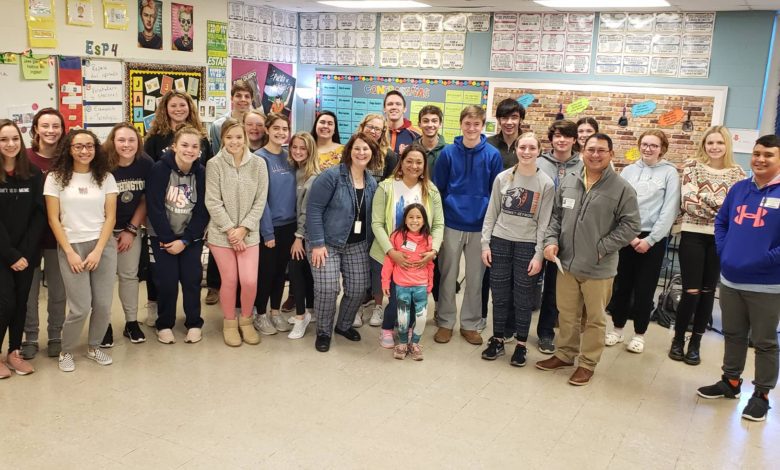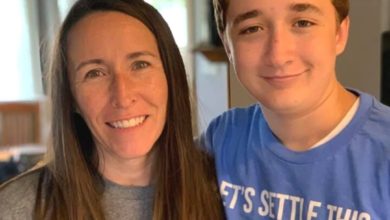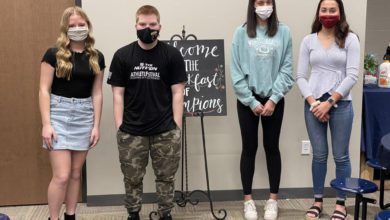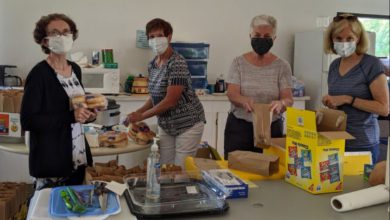Classic Plumbing PLUMBER of the Month: Spanish students at Mahomet-Seymour High School

BY DANI TIETZ
dani@mahometnews.com

Mahomet-Seymour High School students in the Spanish program know what a difference change can make.
Prior to winter break, the group raised $1000.18 for Mission Roatan by collecting change in used water bottles during lunch.
Mission Roatan began in 2006 as a non-profit seeking to raise money for needed resources in the developing Roatan communities.
The money raised has helped to fund community development projects and educational resources.
In 2017, a group of 250 families decided to establish a community, la Colonia Alden Webster, in Roatan. Without an adequate water source, the families, including children, have had to do what they can to get life’s most needed resource.
“They would just literally dig four or five feet down and water would seep up and they would get water from that,” Joey Gruner said.
These holes are where the townspeople would do laundry, get water to wash their dishes and bathe. While they are not supposed to drink from the water, Gruner said sometimes, people, especially children, do.
In 2017, Mission Roatan teamed up with Enrique Valdez, who works with these developing communities to drill wells, to raise $20,000 to provide the infrastructure for a reliable healthy, clean, freshwater source.
Kicking off those fundraising efforts were teams of teachers and students in the Fisher and Mahomet-Seymour communities, among others, who wanted to get behind the project. They raised $4,000.
By 2018, Mission Roatan was able to raise $10,000 to get the project started.
Today, la Colonia Alden Webster is looking to get enough funds ($5,000) to purchase two tanks for water storage and more piping to bring the water from a nearby Colonia on the other side of the mountain to la Colonia Alden Webster.
The $1,000 from Mahomet-Seymour High School helps them get one step closer to their goal for fresh water.
Students in Ellen Ericson’s Spanish IV course were able to meet Enrique Valdez when he and his family visited in January.
“I think a lot of us didn’t really understand the impact that the possibility of raising money would have,” junior Ella Wolters said. “We looked at the pictures and kind of learned, but having him and his family come and see firsthand how grateful they were for what you’re doing because they have seen and understand how necessary it is for them to have the water.”
The impact of $1,000 in the United States might not be felt as strikingly, but junior Daniel Renshaw said that realizing the impact that amount of money can make in another country is eye-opening.
“They were able to put more towards a tank so more waters can get stored up top of the mountain, then distributed to all the other people,” Renshaw said.
Availability of clean water is something the Mahomet-Seymour students say they take for granted.
The Spanish classes took a hydraulic footprint quiz to learn their water consumption.
“They then looked at advice to reduce your footprint,” Ericson said.
As students watched a water consumption chart increase with their answers, they learned that as children there are some things they don’t have control over.
Junior Haley Knauff decided to take control over something that she could: the amount of time she spends in the shower. She also talks to her family about how much time they spend in the shower, too.
“You can influence that a little bit,” Ericson said. “You can’t change everything, just become more conscious and more aware.”
As part of Gen Z, the students believe that the choices they make today can influence the world.
“We hope that we’re the generation of change, and that we’re going to bring change in the world,” Knauff said.
Junior Rachel Myers said their project was a great example of the Butterfly Effect.
“As a class we wouldn’t have been able to do what we did on our own,” she said.
From doing presentations for eighth-grade Spanish students at zero hour and going to basketball games to continue to raise money, Myers said that sometimes movements just start with one person.
Junior Nyah Biegler said that in today’s society everyone wants to be able to make that impact on the world. Growing up in a globally aware era, the students feel like there is a lot of responsibility on their shoulders.
“Realistically thinking, we’re not all going to be able to just change everything about it,” Biegler said.”I think that just taking kind of a little bit of weight off of others shoulders can have a huge effect overall. If everyone chips in just a little bit, overall it will make a strong impact.”
Junior Kazie Rittenhouse said that going through the process of learning about the need in class helped make a strong connection for the Spanish students. But, she said, that those who didn’t know about the impact water could make on this community didn’t seem to care as much.
Junior Ashley Campbell said that hearing from Enrique on the differences between the United States and Roatan, including technological advances really made her realize how blessed she is.
“Just the little things we take for granted,” she said. “That make our lives so much easier.”
Even access to education was eye-opening for the teenagers.
In a country where adults may bring in $300 a month, school costs $250 a month.
“He’s explaining how much harder it is to get a good education there,” Knauff said. “In America we have pretty good public schools, most of the time, especially in Mahomet.”
Students were impressed with how Enrique taught himself how to speak English. He would give English speaking visitors a tour for free in exchange for help learning the language.
“It made me grateful for what we have here and the opportunities to learn to speak Spanish in an awesome environment that’s readily available to us,” Wolters said.
Some of the students had friends that have taken missions trips or gone overseas. Listening to their stories, and the story of Enrique has left an impact on Biegler.
“We have grown up in a society that is privileged,” she said. “We just don’t understand how much we have over other people. We just take so much for granted.”





